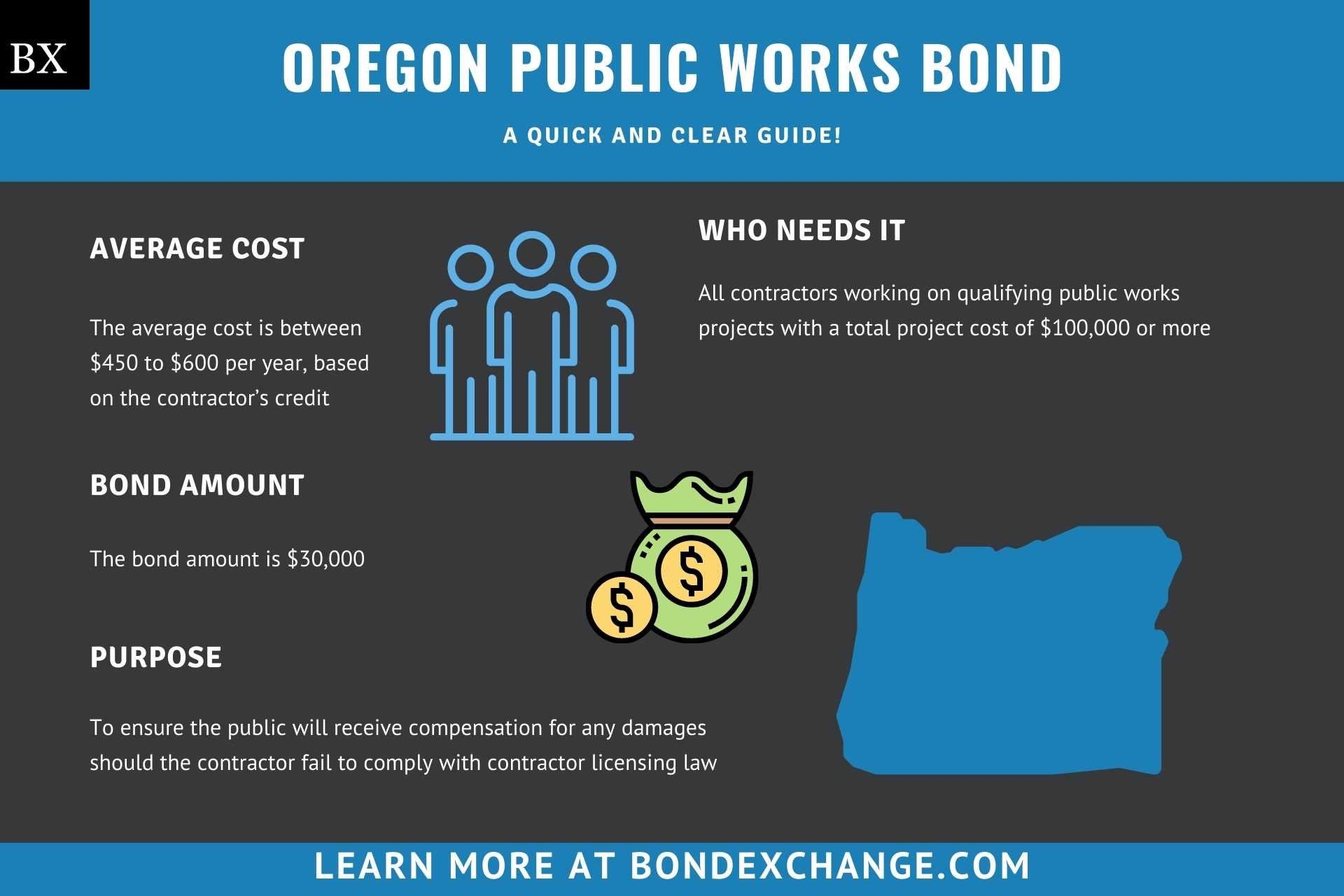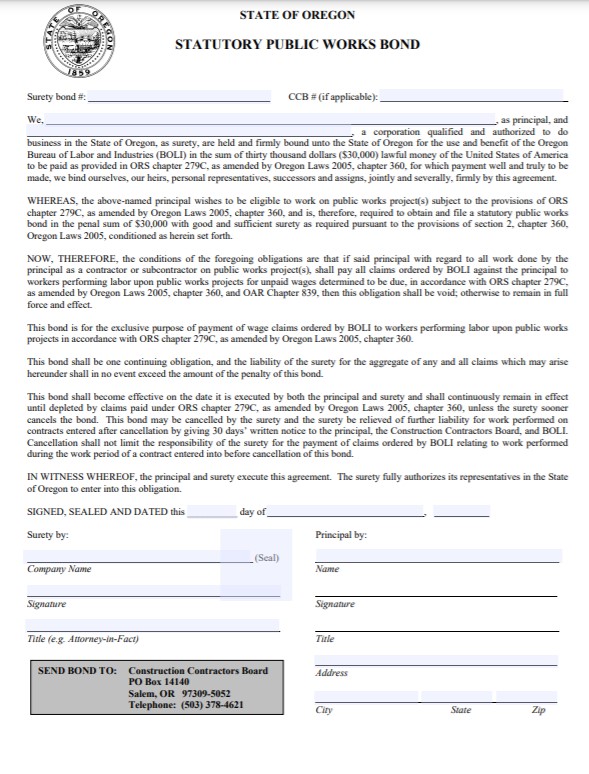Oregon Public Works Bond: A Comprehensive Guide
January 8th, 2021

This guide provides information for insurance agents to help contractors on Oregon Public Works bonds
*This guide focuses solely on the Oregon Public Works Bond. Insurance agents seeking information on the Oregon Contractor License Bond can access that page here
At a Glance:
- Average Cost: Between $450 to $600 per year, based on the contractor’s credit
- Bond Amount: $30,000
- Who Needs It: All contractors working on qualifying public works projects with a total project cost of $100,000 or more
- Purpose: To ensure the public will receive compensation for any damages should the contractor fail to comply with contractor licensing law
- Who Regulates Contractors in Oregon: The Oregon Construction Contractors Board (CCB)
Background
Oregon Statute 279C.836 requires licensed contractors working on qualifying public works projects with a total project cost of $100,000 or more to purchase a $30,000 Public Works Bond. The Oregon legislature enacted the bond requirement to ensure that contractors engage in ethical business practices and remit all required taxes and fees to the state of Oregon.
What is the Purpose of the Oregon Public Works Bond?
Oregon requires contractors to purchase the Public Works bond prior to beginning work on a qualifying public works project. The bond ensures that all construction workers will receive payment if the contractor fails to pay prevailing wages. In short, the bond is a type of insurance that protects construction workers if the contractor does not pay them for work performed.

How Can an Insurance Agent Obtain an Oregon Public Works Surety Bond?
BondExchange makes obtaining an Oregon Public Works Bond easy. Simply login to your account and use our keyword search to find the “contractor” bond in our database. Don’t have a login? Enroll now and let us help you satisfy your customers’ needs. Our friendly underwriting staff is available by phone (800) 438-1162, email or chat from 7:30 AM to 7:00 PM EST to assist you.
At BondExchange, our 40 years of experience, leading technology, and access to markets ensures that we have the knowledge and resources to provide your clients with fast and friendly service whether obtaining quotes or issuing bonds.
Is a Credit Check Required for the Oregon Public Works Bond?
Surety companies will run a credit check on the owners of the contractor company to determine eligibility and pricing for the Oregon Public Works bond. Contractors with excellent credit and work experience can expect to receive the best rates. Contractors with poor credit may be declined by some surety companies or pay higher rates. The credit check is a “soft hit”, meaning that the credit check will not affect the contractor’s credit.
How Much Does the Oregon Public Works Bond Cost?
The Oregon Public Works surety bond can cost anywhere between $450 to $600 per year. Insurance companies determine the rate based on a number of factors including your customer’s credit score and experience. We also offer easy interest-free financing for premiums over $500. The chart below offers a quick reference for the approximate bond cost on the $30,000 bond requirement.
| Credit Score | Bond Cost (1 year) |
|---|---|
| 800+ | $450 |
| 650 – 799 | $600 |
*The credit score ranges do not include other factors that may result in a change to the annual premium offered to your customers, including but not limited to, years of experience and underlying credit factors contained within the business owner’s credit report.
How Does Oregon Define “Public Works Project”?
Oregon Revised Statute 279C.800 defines a public works project as any of the following:
- The construction, repair or improvement of any road, highway, building or structure paid for, in part or in full, by a public agency for the benefit of the public
- The construction, repair or improvement of any road, paid for by a non-public entity, in which a public agency occupies at least 25% of the completed project
- The construction or installation of any device that uses solar radiation on public land
Exemptions to this definition include:
- The reconstruction or renovation of private property that a public agency leases
- The renovation of publicly owned property by a nonprofit if:
- The property has been leased to the non-profit for at least 25 years
- Public funds do not account for more than 15% of the total project costs
Does the Public Works Bond Replace the Contractor License Bond?
No, contractors seeking to obtain a residential or commercial contractor license will still need to purchase a contractors license bond. Contractors who perform public works projects with a total cost exceeding $100,000 will need to need to purchase the Public Works Bond in addition to the Contractor License Bond.
Are There any Exemptions to the Bond Requirement?
Yes, contractors may be exempt from the $30,000 Public Works Bond if any of the following conditions are met:
- The contractor is disadvantaged, minority, a women, disabled veteran, or an emerging small business. Contractors meeting any of these criteria will need to submit a Bond Exemption Form to the CCB.
- The contractor is not required to pay prevailing wages
- A state of emergency is declared
Do Non-Licensed Contractors Need to Purchase the Bond?
Yes, all contractors and subcontractors, regardless of whether or not they are licensed by the CCB, will need to purchase a Public Works Bond when completing a public works project with a total cost of $100,000 or more.
How Do Oregon Contractors File Their Bond With The Oregon CCB?
Contractors should mail the completed bond form, including the power of attorney, to the following address:
Construction Contractors Board
PO Box 14140
Salem, OR 97309-5052
The contractor license surety bond requires signatures from both the surety company that issues the bond and the contractor. The surety company should include the following information on the bond form:
- Legal name of entity/individual(s) buying the bond
- Surety company’s name
- Date the bond is signed
What Can Contractors Do to Avoid Claims Against the Oregon Public Works Bond?
To avoid claims on the Public Works Bond, contractors must pay all prevailing wages on time and in full.
How Does Oregon Define “Prevailing Wage”?
To paraphrase Oregon Statute 279C.800, a prevailing wage is the amount of funds that contractors must pay construction workers on a public works project. The prevailing wage rate is determined by the Commissioner of the Oregon Bureau of Labor and Industries prior to beginning work on a public works project.
What Other Insurance Products Can Agents Offer Contractors in Oregon?
Oregon requires residential and general contractors to obtain liability insurance. In addition, contractors with employees will have to purchase workers’ compensation insurance. Bonds are our only business at BondExchange, so we do not issue liability or workers’ compensation insurance, but our agents often utilize brokers for this specific line of business. A list of brokers in this space can be found here.
How Can Insurance Agents Prospect for Oregon Contractor Customers?
Oregon conveniently provides a public database to search for active residential and commercial contractors in the state. The database can be accessed here. Contact BondExchange for additional marketing resources. Agents can also leverage our print-mail relationships for discounted mailing services.
What other Contractor License Bonds are Required in Oregon?
Contractors in Oregon will need to obtain specific bonds correlating with their license type. Below are all the different contractor licensing bonds required by the State of Oregon:
- Contractor License – Bond limit ranges between $10,000 – $75,000
- Sewage Disposal Service – $15,000 and $5,000 bond limits
- Landscape Contractor – Bond limit ranges between $3,000 – $20,000

